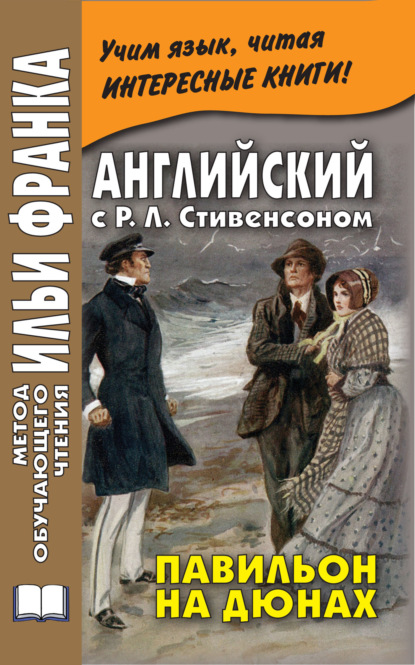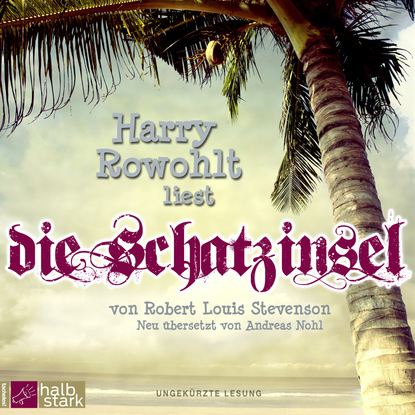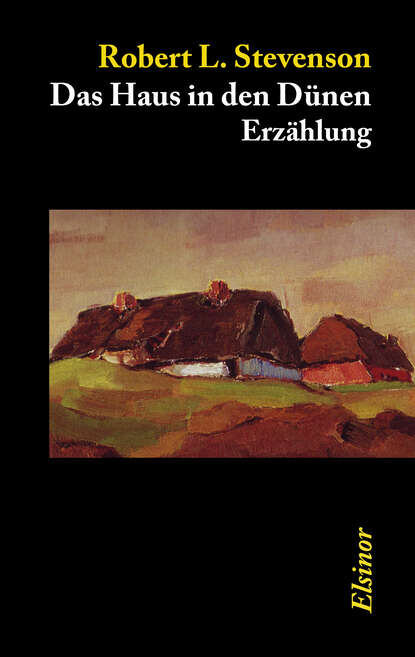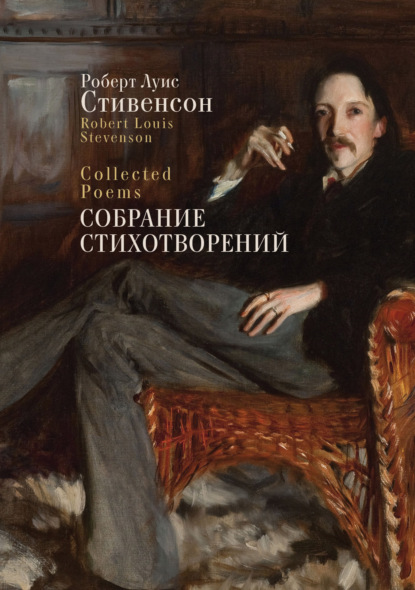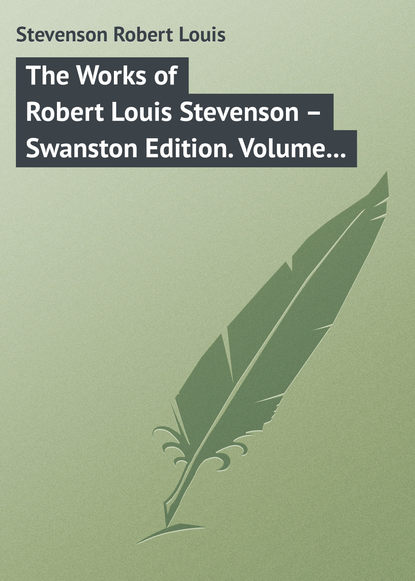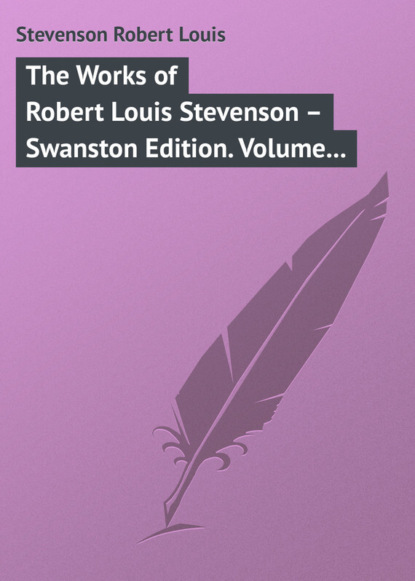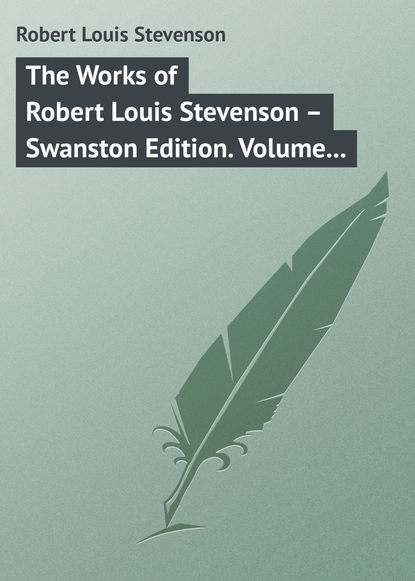 Полная версия
Полная версияПолная версия:
Роберт Льюис Стивенсон The Works of Robert Louis Stevenson – Swanston Edition. Volume 14
- + Увеличить шрифт
- - Уменьшить шрифт

Robert Louis Stevenson
The Works of Robert Louis Stevenson – Swanston Edition, Vol. 14
A CHILD’S GARDEN OF VERSES
I
BED IN SUMMER
In winter I get up at nightAnd dress by yellow candle-light.In summer, quite the other way, —I have to go to bed by day.I have to go to bed and seeThe birds still hopping on the tree,Or hear the grown-up people’s feetStill going past me in the street.And does it not seem hard to you,When all the sky is clear and blue,And I should like so much to play,To have to go to bed by day?II
A THOUGHT
It is very nice to thinkThe world is full of meat and drink,With little children saying graceIn every Christian kind of place.III
AT THE SEA-SIDE
When I was down beside the sea,A wooden spade they gave to meTo dig the sandy shore.My holes were empty like a cup,In every hole the sea came up,Till it could come no more.IV
YOUNG NIGHT THOUGHT
All night long, and every night,When my mamma puts out the light,I see the people marching by,As plain as day, before my eye.Armies and emperors and kings,All carrying different kinds of things,And marching in so grand a way,You never saw the like by day.So fine a show was never seenAt the great circus on the green;For every kind of beast and manIs marching in that caravan.At first they move a little slow,But still the faster on they go,And still beside them close I keepUntil we reach the town of Sleep.V
WHOLE DUTY OF CHILDREN
A child should always say what’s true,And speak when he is spoken to,And behave mannerly at table:At least as far as he is able.VI
RAIN
The rain is raining all around,It falls on field and tree,It rains on the umbrellas here,And on the ships at sea.VII
PIRATE STORY
Three of us afloat in the meadow by the swing,Three of us aboard in the basket on the lea.Winds are in the air, they are blowing in the spring,And waves are on the meadow like the waves there are at sea.Where shall we adventure, to-day that we’re afloat,Wary of the weather, and steering by a star?Shall it be to Africa, a-steering of the boat,To Providence, or Babylon, or off to Malabar?Hi! but here’s a squadron a-rowing on the sea —Cattle on the meadow a-charging with a roar!Quick, and we’ll escape them, they’re as mad as they can be,The wicket is the harbour and the garden is the shore.VIII
FOREIGN LANDS
Up into the cherry-treeWho should climb but little me?I held the trunk with both my handsAnd looked abroad on foreign lands.I saw the next-door garden lie,Adorned with flowers, before my eye,And many pleasant places moreThat I had never seen before.I saw the dimpling river passAnd be the sky’s blue looking-glass;The dusty roads go up and downWith people tramping in to town.If I could find a higher tree,Farther and farther I should seeTo where the grown-up river slipsInto the sea among the ships,To where the roads on either handLead onward into fairy-land,Where all the children dine at five,And all the playthings come alive.IX
WINDY NIGHTS
Whenever the moon and stars are set,Whenever the wind is high,All night long in the dark and wet,A man goes riding by.Late in the night when the fires are out,Why does he gallop and gallop about?Whenever the trees are crying aloud,And ships are tossed at sea,By, on the highway, low and loud,By at the gallop goes he.By at the gallop he goes, and thenBy he comes back at the gallop again.X
TRAVEL
I should like to rise and goWhere the golden apples grow; —Where below another skyParrot islands anchored lie,And, watched by cockatoos and goats,Lonely Crusoes building boats; —Where in sunshine reaching outEastern cities, miles about,Are with mosque and minaretAmong sandy gardens set,And the rich goods from near and farHang for sale in the bazaar; —Where the Great Wall round China goes,And on one side the desert blows,And with bell and voice and drum,Cities on the other hum; —Where are forests, hot as fire,Wide as England, tall as a spire,Full of apes and cocoa-nutsAnd the negro hunters’ huts; —Where the knotty crocodileLies and blinks in the Nile,And the red flamingo fliesHunting fish before his eyes; —Where in jungles, near and far,Man-devouring tigers are,Lying close and giving earLest the hunt be drawing near,Or a comer-by be seenSwinging in a palanquin; —Where among the desert sandsSome deserted city stands,All its children, sweep and prince,Grown to manhood ages since,Not a foot in street or house,Nor a stir of child or mouse,And when kindly falls the night,In all the town no spark of light.There I’ll come when I’m a manWith a camel caravan;Light a fire in the gloomOf some dusty dining-room;See the pictures on the walls,Heroes, fights, and festivals;And in a corner find the toysOf the old Egyptian boys.XI
SINGING
Of speckled eggs the birdie singsAnd nests among the trees;The sailor sings of ropes and thingsIn ships upon the seas.The children sing in far Japan,The children sing in Spain;The organ with the organ manIs singing in the rain.XII
LOOKING FORWARD
When I am grown to man’s estateI shall be very proud and great,And tell the other girls and boysNot to meddle with my toys.XIII
A GOOD PLAY
We built a ship upon the stairsAll made of the back-bedroom chairsAnd filled it full of sofa pillowsTo go a-sailing on the billows.We took a saw and several nails,And water in the nursery pails;And Tom said, “Let us also takeAn apple and a slice of cake”; —Which was enough for Tom and meTo go a-sailing on, till tea.We sailed along for days and days,And had the very best of plays;But Tom fell out and hurt his knee,So there was no one left but me.XIV
WHERE GO THE BOATS?
Dark brown is the river,Golden is the sand.It flows along for ever,With trees on either hand.Green leaves a-floating,Castles of the foam,Boats of mine a-boating —Where will all come home?On goes the river,And out past the mill,Away down the valley,Away down the hill.Away down the river,A hundred miles or more,Other little childrenShall bring my boats ashore.XV
AUNTIE’S SKIRTS
Whenever Auntie moves around,Her dresses make a curious sound;They trail behind her up the floor,And trundle after through the door.XVI
THE LAND OF COUNTERPANE
When I was sick and lay a-bed,I had two pillows at my head,And all my toys beside me layTo keep me happy all the day.And sometimes for an hour or soI watched my leaden soldiers go,With different uniforms and drills,Among the bed-clothes, through the hills;And sometimes sent my ships in fleetsAll up and down among the sheets;Or brought my trees and houses out,And planted cities all about.I was the giant great and stillThat sits upon the pillow-hill,And sees before him, dale and plain,The pleasant land of counterpane.XVII
THE LAND OF NOD
From breakfast on all through the dayAt home among my friends I stay;But every night I go abroadAfar into the land of Nod.All by myself I have to go,With none to tell me what to do —All alone beside the streamsAnd up the mountain-sides of dreams.The strangest things are there for me,Both things to eat and things to see,And many frightening sights abroadTill morning in the land of Nod.Try as I like to find the way,I never can get back by day,Nor can remember plain and clearThe curious music that I hear.XVIII
MY SHADOW
I have a little shadow that goes in and out with me,And what can be the use of him is more than I can see.He is very, very like me from the heels up to the head;And I see him jump before me, when I jump into my bed.The funniest thing about him is the way he likes to grow —Not at all like proper children, which is always very slow;For he sometimes shoots up taller like an india-rubber ball,And he sometimes gets so little that there’s none of him at all.He hasn’t got a notion of how children ought to play,And can only make a fool of me in every sort of way.He stays so close beside me, he’s a coward you can see;I’d think shame to stick to nursie as that shadow sticks to me!One morning, very early, before the sun was up,I rose and found the shining dew on every buttercup;But my lazy little shadow, like an arrant sleepy-head,Had stayed at home behind me and was fast asleep in bed.XIX
SYSTEM
Every night my prayers I say,And get my dinner every day;And every day that I’ve been good,I get an orange after food.The child that is not clean and neat,With lots of toys and things to eat,He is a naughty child, I’m sure —Or else his dear papa is poor.XX
A GOOD BOY
I woke before the morning, I was happy all the day,I never said an ugly word, but smiled and stuck to play.And now at last the sun is going down behind the wood,And I am very happy, for I know that I’ve been good.My bed is waiting cool and fresh, with linen smooth and fair,And I must off to sleepsin-by, and not forget my prayer.I know that, till to-morrow I shall see the sun arise,No ugly dream shall fright my mind, no ugly sight my eyes,But slumber hold me tightly till I waken in the dawn,And hear the thrushes singing in the lilacs round the lawn.XXI
ESCAPE AT BEDTIME
The lights from the parlour and kitchen shone outThrough the blinds and the windows and bars;And high overhead and all moving about,There were thousands of millions of stars.There ne’er were such thousands of leaves on a tree,Nor of people in church or the Park,As the crowds of the stars that looked down upon me,And that glittered and winked in the dark.The Dog, and the Plough, and the Hunter, and all,And the star of the sailor, and Mars,These shone in the sky, and the pail by the wallWould be half full of water and stars.They saw me at last, and they chased me with cries,And they soon had me packed into bed;But the glory kept shining and bright in my eyes,And the stars going round in my head.XXII
MARCHING SONG
Bring the comb and play upon it!Marching, here we come!Willie cocks his Highland bonnet,Johnnie beats the drum.Mary Jane commands the party,Peter leads the rear;Feet in time, alert and hearty,Each a Grenadier!All in the most martial mannerMarching double-quick;While the napkin like a bannerWaves upon the stick!Here’s enough of fame and pillage,Great commander Jane!Now that we’ve been round the village,Let’s go home again.XXIII
THE COW
The friendly cow, all red and white,I love with all my heart:She gives me cream with all her might,To eat with apple-tart.She wanders lowing here and there,And yet she cannot stray,All in the pleasant open air,The pleasant light of day;And blown by all the winds that pass,And wet with all the showers,She walks among the meadow grassAnd eats the meadow flowers.XXIV
HAPPY THOUGHT
The world is so full of a number of things,I’m sure we should all be as happy as kings.XXV
THE WIND
I saw you toss the kites on highAnd blow the birds about the sky;And all around I heard you pass,Like ladies’ skirts across the grass —O wind, a-blowing all day long,O wind, that sings so loud a song!I saw the different things you did,But always you yourself you hid.I felt you push, I heard you call,I could not see yourself at all —O wind, a-blowing all day long,O wind, that sings so loud a song!O you that are so strong and cold,O blower, are you young or old?Are you a beast of field and tree,Or just a stronger child than me?O wind, a-blowing all day long,O wind, that sings so loud a song!XXVI
KEEPSAKE MILL
Over the borders, a sin without pardon,Breaking the branches and crawling below,Out through the breach in the wall of the garden,Down by the banks of the river, we go.Here is the mill with the humming of thunder,Here is the weir with the wonder of foam,Here is the sluice with the race running under —Marvellous places, though handy to home!Sounds of the village grow stiller and stiller,Stiller the note of the birds on the hill;Dusty and dim are the eyes of the miller,Deaf are his ears with the moil of the mill.Years may go by, and the wheel in the river,Wheel as it wheels for us, children, to-day,Wheel and keep roaring and foaming for ever,Long after all of the boys are away.Home from the Indies, and home from the ocean,Heroes and soldiers we all shall come home;Still we shall find the old mill-wheel in motion,Turning and churning that river to foam.You with the bean that I gave when we quarrelled,I with your marble of Saturday last,Honoured and old and all gaily apparelled,Here we shall meet and remember the past.XXVII
GOOD AND BAD CHILDREN
Children, you are very little,And your bones are very brittle;If you would grow great and stately,You must try to walk sedately.You must still be bright and quiet,And content with simple diet;And remain, through all bewild’ring,Innocent and honest children.Happy hearts and happy faces,Happy play in grassy places —That was how, in ancient ages,Children grew to kings and sages.But the unkind and the unruly,And the sort who eat unduly,They must never hope for glory —Theirs is quite a different story!Cruel children, crying babies,All grow up as geese and gabies,Hated, as their age increases,By their nephews and their nieces.XXVIII
FOREIGN CHILDREN
Little Indian, Sioux or Crow,Little frosty Eskimo,Little Turk or Japanee,O! don’t you wish that you were me?You have seen the scarlet treesAnd the lions over seas;You have eaten ostrich eggs,And turned the turtles off their legs.Such a life is very fine,But it’s not so nice as mine;You must often, as you trod,Have wearied not to be abroad.You have curious things to eat,I am fed on proper meat;You must dwell beyond the foam,But I am safe and live at home.Little Indian, Sioux or CrowLittle frosty Eskimo,Little Turk or Japanee,O! don’t you wish that you were me?XXIX
THE SUN’S TRAVELS
The sun is not a-bed when IAt night upon my pillow lie;Still round the earth his way he takes,And morning after morning makes.While here at home, in shining day,We round the sunny garden play,Each little Indian sleepy-headIs being kissed and put to bed.And when at eve I rise from tea,Day dawns beyond the Atlantic Sea,And all the children in the WestAre getting up and being dressed.XXX
THE LAMPLIGHTER
My tea is nearly ready and the sun has left the sky;It’s time to take the window to see Leerie going by;For every night at tea-time and before you take your seat,With lantern and with ladder he comes posting up the street.Now Tom would be a driver and Maria go to sea,And my papa’s a banker and as rich as he can be;But I, when I am stronger, and can choose what I’m to do,O Leerie, I’ll go round at night and light the lamps with you!For we are very lucky, with a lamp before the door,And Leerie stops to light it as he lights so many more;And O! before you hurry by with ladder and with light,O Leerie, see a little child and nod to him to-night!XXXI
MY BED IS A BOAT
My bed is like a little boat;Nurse helps me in when I embark;She girds me in my sailor’s coatAnd starts me in the dark.At night, I go on board and sayGood-night to all my friends on shore;I shut my eyes and sail awayAnd see and hear no more.And sometimes things to bed I take,As prudent sailors have to do:Perhaps a slice of wedding-cake,Perhaps a toy or two.All night across the dark we steer:But when the day returns at last,Safe in my room, beside the pier,I find my vessel fast.XXXII
THE MOON
The moon has a face like the clock in the hall;She shines on thieves on the garden wall,On streets and fields and harbour quays,And birdies asleep in the forks of the trees.The squalling cat and the squeaking mouse,The howling dog by the door of the house,The bat that lies in bed at noon,All love to be out by the light of the moon.But all of the things that belong to the dayCuddle to sleep to be out of her way;And flowers and children close their eyesTill up in the morning the sun shall arise.XXXIII
THE SWING
How do you like to go up in a swing,Up in the air so blue?Oh, I do think it the pleasantest thingEver a child can do!Up in the air and over the wall,Till I can see so wide,Rivers and trees and cattle and allOver the countryside —Till I look down on the garden green,Down on the roof so brown —Up in the air I go flying again,Up in the air and down!XXXIV
TIME TO RISE
A birdie with a yellow billHopped upon the window sill,Cocked his shining eye and said:“Ain’t you ’shamed, you sleepy-head?”XXXV
LOOKING-GLASS RIVER
Smooth it slides upon its travel,Here a wimple, there a gleam —O the clean gravel!O the smooth stream!Sailing blossoms, silver fishes,Paven pools as clear as air —How a child wishesTo live down there!We can see our coloured facesFloating on the shaken poolDown in cool places,Dim and very cool;Till a wind or water wrinkle,Dipping marten, plumping trout,Spreads in a twinkleAnd blots all out.See the rings pursue each other;All below grows black as night,Just as if motherHad blown out the light!Patience, children, just a minute —See the spreading circles die;The stream and all in itWill clear by-and-by.XXXVI
FAIRY BREAD
Come up here, O dusty feet!Here is fairy bread to eat.Here in my retiring room,Children, you may dineOn the golden smell of broomAnd the shade of pine;And when you have eaten well,Fairy stories hear and tell.XXXVII
FROM A RAILWAY CARRIAGE
Faster than fairies, faster than witches,Bridges and houses, hedges and ditches;And charging along like troops in a battle,All through the meadows the horses and cattle:All of the sights of the hill and the plainFly as thick as driving rain;And ever again, in the wink of an eye,Painted stations whistle by.Here is a child who clambers and scrambles,All by himself and gathering brambles;Here is a tramp who stands and gazes;And there is the green for stringing the daisies!Here is a cart run away in the roadLumping along with man and load;And here is a mill, and there is a river:Each a glimpse and gone for ever!XXXVIII
WINTER-TIME
Late lies the wintry sun a-bed,A frosty, fiery sleepy-head;Blinks but an hour or two; and then,A blood-red orange, sets again.Before the stars have left the skies,At morning in the dark I rise;And shivering in my nakedness,By the cold candle, bathe and dress.Close by the jolly fire I sitTo warm my frozen bones a bit;Or with a reindeer-sled exploreThe colder countries round the door.When, to go out, my nurse doth wrapMe in my comforter and cap,The cold wind burns my face, and blowsIts frosty pepper up my nose.Black are my steps on silver sod;Thick blows my frosty breath abroad;And tree and house, and hill and lake,Are frosted like a wedding-cake.XXXIX
THE HAYLOFT
Through all the pleasant meadow-sideThe grass grew shoulder-high,Till the shining scythes went far and wideAnd cut it down to dry.These green and sweetly smelling cropsThey led in waggons home;And they piled them here in mountain topsFor mountaineers to roam.Here is Mount Clear, Mount Rusty-Nail,Mount Eagle and Mount High; —The mice that in these mountains dwellNo happier are than I!O what a joy to clamber there,O what a place for play,With the sweet, the dim, the dusty air,The happy hills of hay.XL
FAREWELL TO THE FARM
The coach is at the door at last;The eager children, mounting fastAnd kissing hands, in chorus sing:Good-bye, good-bye, to everything!To house and garden, field and lawn,The meadow-gates we swang upon,To pump and stable, tree and swing,Good-bye, good-bye, to everything!And fare you well for evermore,O ladder at the hayloft door,O hayloft where the cobwebs cling,Good-bye, good-bye, to everything!Crack goes the whip, and off we go;The trees and houses smaller grow;Last, round the woody turn we swing:Good-bye, good-bye, to everything!XLI
NORTH-WEST PASSAGE
1. GOOD NIGHT
When the bright lamp is carried in,The sunless hours again begin;O’er all without, in field and lane,The haunted night returns again.Now we behold the embers fleeAbout the firelit hearth; and seeOur faces painted as we pass,Like pictures, on the window-glass.Must we to bed indeed? Well then,Let us arise and go like men,And face with an undaunted treadThe long black passage up to bed.Farewell, O brother, sister, sire!O pleasant party round the fire!The songs you sing, the tales you tell,Till far to-morrow, fare ye well!2. SHADOW MARCH
All round the house is the jet-black night;It stares through the window-pane;It crawls in the corners, hiding from the light,And it moves with the moving flame.Now my little heart goes a-beating like a drum,With the breath of the Bogie in my hair;And all round the candle the crooked shadows comeAnd go marching along up the stair.The shadow of the balusters, the shadow of the lamp,The shadow of the child that goes to bed —All the wicked shadows coming, tramp, tramp, tramp,With the black night overhead.3. IN PORT
Last, to the chamber where I lieMy fearful footsteps patter nigh,And come from out the cold and gloomInto my warm and cheerful room.There, safe arrived, we turned aboutTo keep the coming shadows out,And close the happy door at lastOn all the perils that we passed.Then, when mamma goes by to bed,She shall come in with tip-toe tread,And see me lying warm and fastAnd in the land of Nod at last.THE CHILD ALONE
I
THE UNSEEN PLAYMATE
When children are playing alone on the green,In comes the playmate that never was seen.When children are happy and lonely and good,The Friend of the Children comes out of the wood.Nobody heard him and nobody saw,His is a picture you never could draw,But he’s sure to be present, abroad or at home,When children are happy and playing alone.He lies in the laurels, he runs on the grass,He sings when you tinkle the musical glass;Whene’er you are happy and cannot tell why,The Friend of the Children is sure to be by!He loves to be little, he hates to be big,’Tis he that inhabits the caves that you dig;’Tis he when you play with your soldiers of tinThat sides with the Frenchmen and never can win.’Tis he, when at night you go off to your bed,Bids you go to your sleep and not trouble your head;For wherever they’re lying, in cupboard or shelf,’Tis he will take care of your playthings himself!II
MY SHIP AND I
O it’s I that am the captain of a tidy little ship,Of a ship that goes a-sailing on the pond;And my ship it keeps a-turning all around and all about;But when I’m a little older, I shall find the secret outHow to send my vessel sailing on beyond.For I mean to grow as little as the dolly at the helm,And the dolly I intend to come alive;And with him beside to help me, it’s a-sailing I shall go,It’s a-sailing on the water, when the jolly breezes blowAnd the vessel goes a divie-divie-dive.O it’s then you’ll see me sailing through the rushes and the reeds,And you’ll hear the water singing at the prow;For beside the dolly sailor, I’m to voyage and explore,To land upon the island where no dolly was before,And to fire the penny cannon in the bow.

